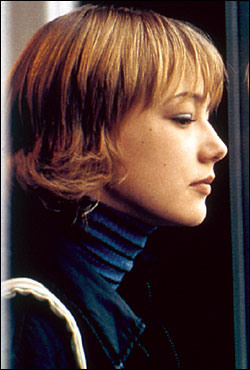UNDER THE SAND
directed by Fran篩s Ozon with Charlotte Rampling, Bruno Cremer, and Jacques Nolot runs August 3-9 at Varsity
FRENCH DIRECTOR Fran篩s Ozon has said that he’s never forgotten what he witnessed at the seaside with his family when he was 9 or 10. Each day they watched a companionable Dutch couple in their 60s going to and from the beach—until the day the husband went for a swim and never came back.
The young Ozon saw the helicopter and the commotion; he also saw the wife gathering her husband’s things, going back to their place, alone. His imagination was struck by an almost unanswerable question: What would her life would be like after such a catastrophe?
That was roughly 25 years ago, and presumably Ozon’s mind can now release its grip on the incident. With Under the Sand, he has tossed it into our minds, where— because of his precision and his great taste in actresses—we are now likely to brood about it for at least 25 years ourselves.
Marie (Charlotte Rampling) and Jean (Bruno Cremer) are the film’s long-married couple, quietly affectionate while driving to their country beach place, the necessity of every comfortably off French family. As he picks up firewood and she fixes spaghetti for dinner, everything about them signals a couple at peace with life and each other. For his sake, she’d like Jean to lose some weight, yet curling up against him, Marie seems to relish the protection his bulk gives.
The next morning, on a deserted beach, Marie dozes while Jean decides on a swim. Hindsight lets us see that as Jean’s eyes sweep the ocean, it is the gaze of a man taking the measure of the water. Perhaps. Nothing in Ozon is ever sure.
IN THE PANIC that follows, when Marie wakes to find her husband gone, we’re swept up with her searches and statements to the police. We may not remember until later Jean’s heavy sighs of the night before, his preoccupation, his long scrutiny of the ants scattering in chaos from a log he’s hefted. It’s an Ozon trademark, fixing details in our psyches almost subliminally. Worlds within worlds, things beneath the sand or a little under the surface are the stuff of an Ozon universe (which includes See the Sea and Criminal Lovers).
Marie takes this body blow entirely alone—no calls to friends, no chance of grief over a corpse when there is none. Her response is complete denial. More than six months later, at her closest friends’ house, she still talks about Jean in the present tense, even when they’ve obviously invited an available man, Vincent (Jacques Nolot), to meet her.
Although the urgencies of the real world, such as Jean’s frozen bank account, should force Marie to acknowledge Jean’s death, she keeps the truth at bay. Sand becomes a moving and profound exploration of grief and longing, most erotically expressed in Marie’s reverie after she’s come home from a night out, then imagines—and we see—both her husband’s and her lover’s hands moving over her body.
Best known for Stardust Memories (1980) and The Night Porter (1974), Rampling has always excelled at tamped-down emotion. Here, she’s superb in mirroring Marie’s kaleidoscopic moods, which allow us to perceive Jean, too, since our vantage point is hers and he’s still there in her mind (and their apartment). As Vincent pursues Marie further, she tells the amusingly complacent Jean everything about her new lover. (Presumably such complacency comes more easily when you’re dead—or French.)
Even when events finally push Marie closer to reality, Ozon keeps the ending open and debatable, making Sand an elegant and unforgettable enigma.








